Administrative Law and Constitutionalism
VerifiedAdded on 2020/06/06
|14
|3795
|34
AI Summary
This assignment delves into the intricate relationship between administrative law and constitutionalism. It presents a list of seminal works and online resources that shed light on core concepts within administrative law, such as agency power, judicial review, and procedural fairness. The assigned readings encompass both classic texts and contemporary scholarship, offering diverse perspectives on the evolution and application of administrative law principles.
Contribute Materials
Your contribution can guide someone’s learning journey. Share your
documents today.
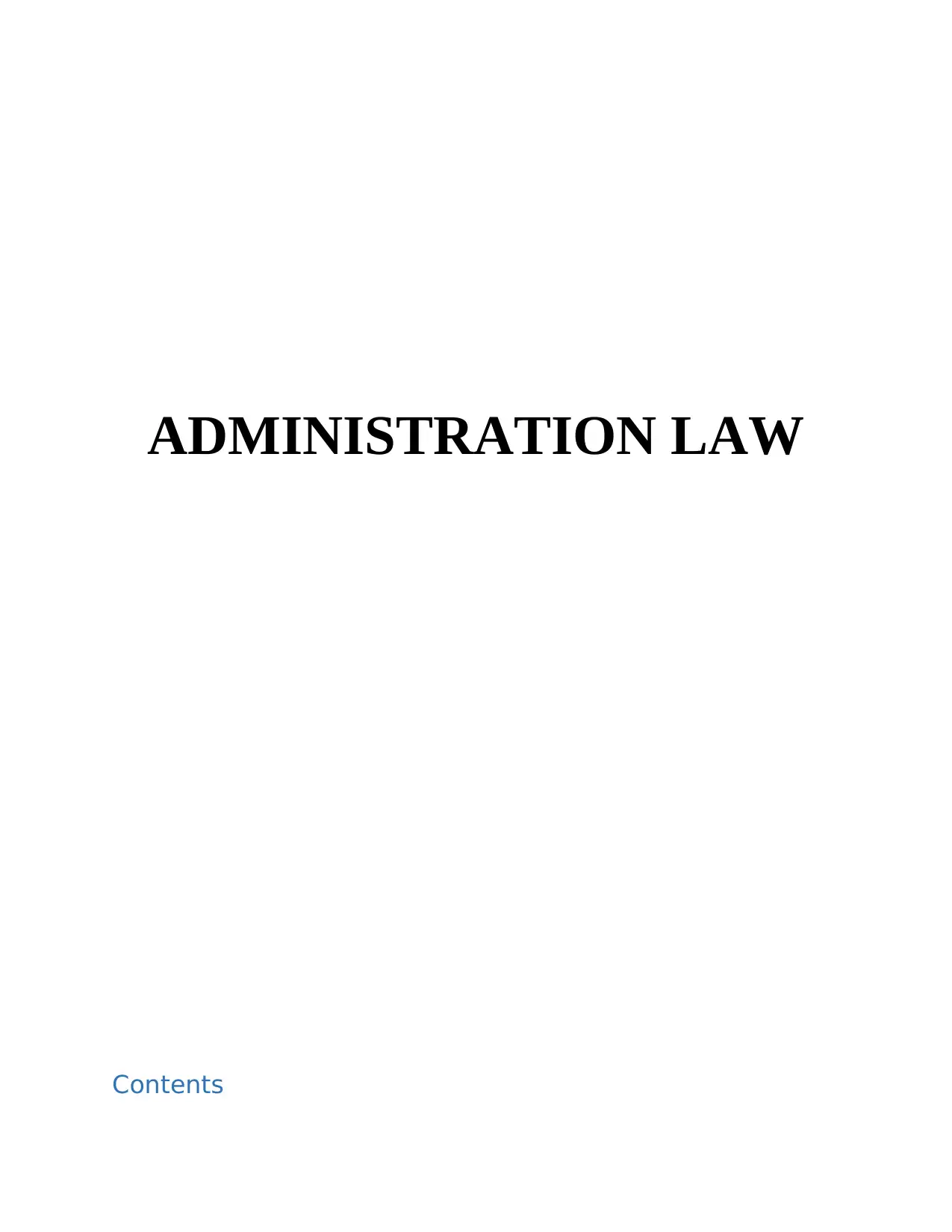
ADMINISTRATION LAW
Contents
Contents
Secure Best Marks with AI Grader
Need help grading? Try our AI Grader for instant feedback on your assignments.
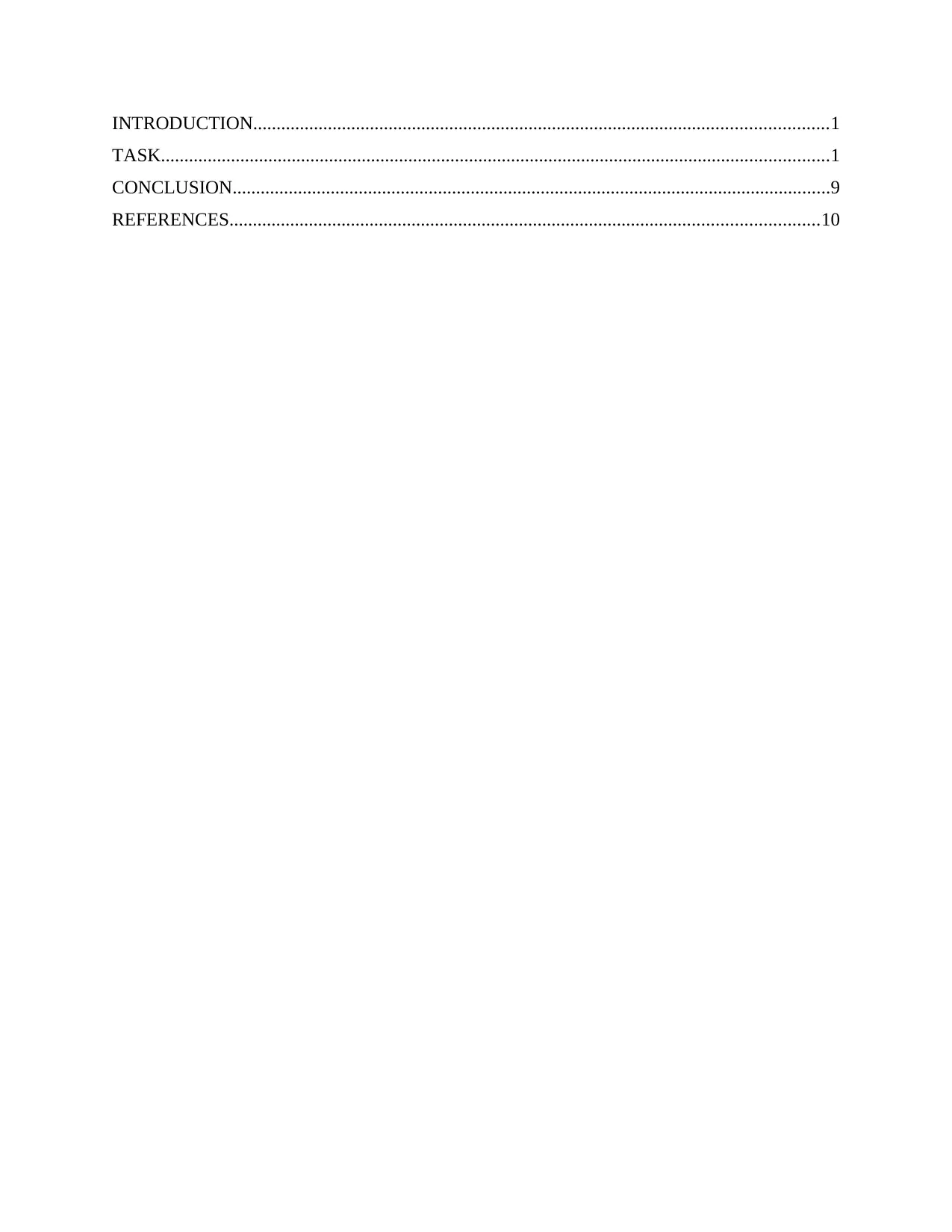
INTRODUCTION...........................................................................................................................1
TASK...............................................................................................................................................1
CONCLUSION................................................................................................................................9
REFERENCES..............................................................................................................................10
TASK...............................................................................................................................................1
CONCLUSION................................................................................................................................9
REFERENCES..............................................................................................................................10

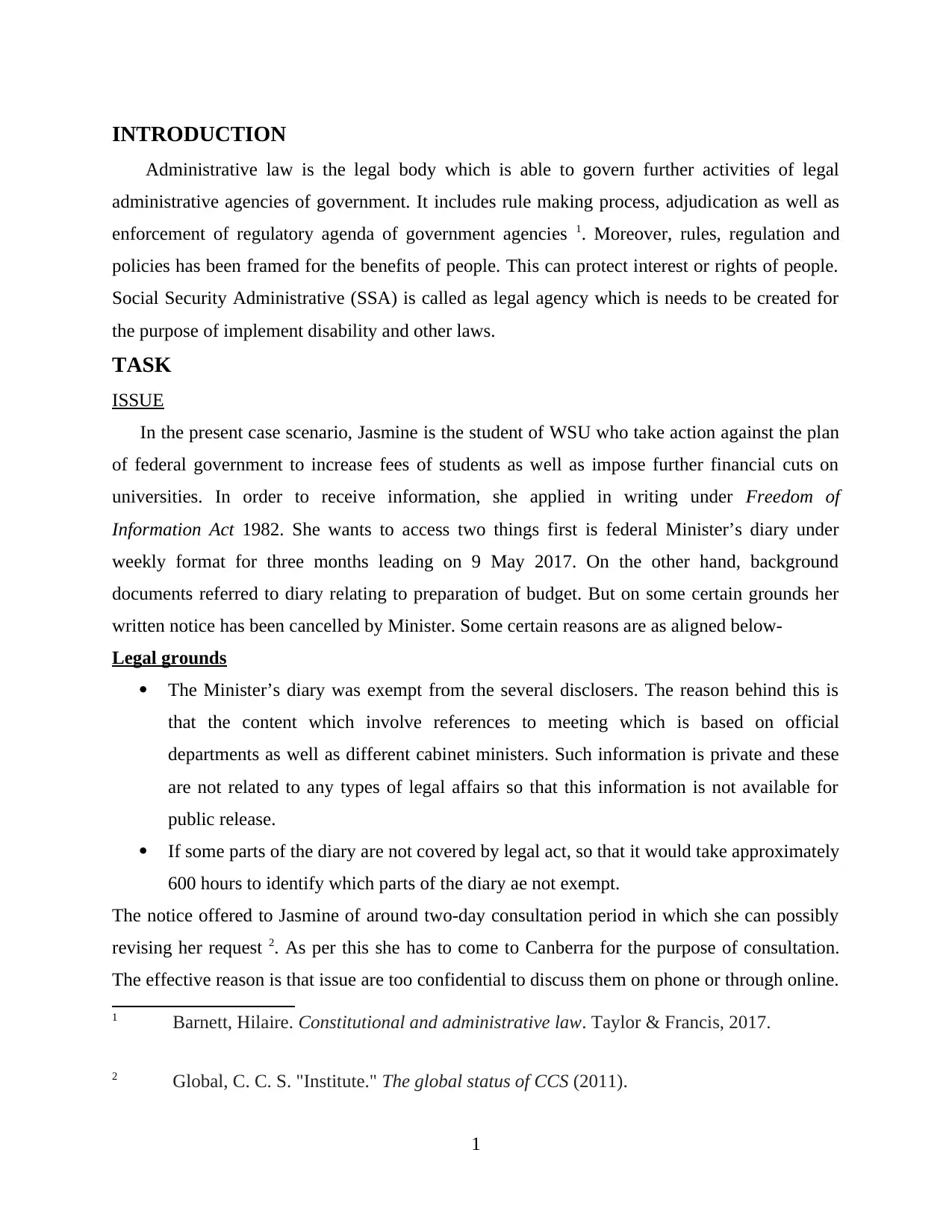
INTRODUCTION
Administrative law is the legal body which is able to govern further activities of legal
administrative agencies of government. It includes rule making process, adjudication as well as
enforcement of regulatory agenda of government agencies 1. Moreover, rules, regulation and
policies has been framed for the benefits of people. This can protect interest or rights of people.
Social Security Administrative (SSA) is called as legal agency which is needs to be created for
the purpose of implement disability and other laws.
TASK
ISSUE
In the present case scenario, Jasmine is the student of WSU who take action against the plan
of federal government to increase fees of students as well as impose further financial cuts on
universities. In order to receive information, she applied in writing under Freedom of
Information Act 1982. She wants to access two things first is federal Minister’s diary under
weekly format for three months leading on 9 May 2017. On the other hand, background
documents referred to diary relating to preparation of budget. But on some certain grounds her
written notice has been cancelled by Minister. Some certain reasons are as aligned below-
Legal grounds
The Minister’s diary was exempt from the several disclosers. The reason behind this is
that the content which involve references to meeting which is based on official
departments as well as different cabinet ministers. Such information is private and these
are not related to any types of legal affairs so that this information is not available for
public release.
If some parts of the diary are not covered by legal act, so that it would take approximately
600 hours to identify which parts of the diary ae not exempt.
The notice offered to Jasmine of around two-day consultation period in which she can possibly
revising her request 2. As per this she has to come to Canberra for the purpose of consultation.
The effective reason is that issue are too confidential to discuss them on phone or through online.
1 Barnett, Hilaire. Constitutional and administrative law. Taylor & Francis, 2017.
2 Global, C. C. S. "Institute." The global status of CCS (2011).
1
Administrative law is the legal body which is able to govern further activities of legal
administrative agencies of government. It includes rule making process, adjudication as well as
enforcement of regulatory agenda of government agencies 1. Moreover, rules, regulation and
policies has been framed for the benefits of people. This can protect interest or rights of people.
Social Security Administrative (SSA) is called as legal agency which is needs to be created for
the purpose of implement disability and other laws.
TASK
ISSUE
In the present case scenario, Jasmine is the student of WSU who take action against the plan
of federal government to increase fees of students as well as impose further financial cuts on
universities. In order to receive information, she applied in writing under Freedom of
Information Act 1982. She wants to access two things first is federal Minister’s diary under
weekly format for three months leading on 9 May 2017. On the other hand, background
documents referred to diary relating to preparation of budget. But on some certain grounds her
written notice has been cancelled by Minister. Some certain reasons are as aligned below-
Legal grounds
The Minister’s diary was exempt from the several disclosers. The reason behind this is
that the content which involve references to meeting which is based on official
departments as well as different cabinet ministers. Such information is private and these
are not related to any types of legal affairs so that this information is not available for
public release.
If some parts of the diary are not covered by legal act, so that it would take approximately
600 hours to identify which parts of the diary ae not exempt.
The notice offered to Jasmine of around two-day consultation period in which she can possibly
revising her request 2. As per this she has to come to Canberra for the purpose of consultation.
The effective reason is that issue are too confidential to discuss them on phone or through online.
1 Barnett, Hilaire. Constitutional and administrative law. Taylor & Francis, 2017.
2 Global, C. C. S. "Institute." The global status of CCS (2011).
1
Secure Best Marks with AI Grader
Need help grading? Try our AI Grader for instant feedback on your assignments.
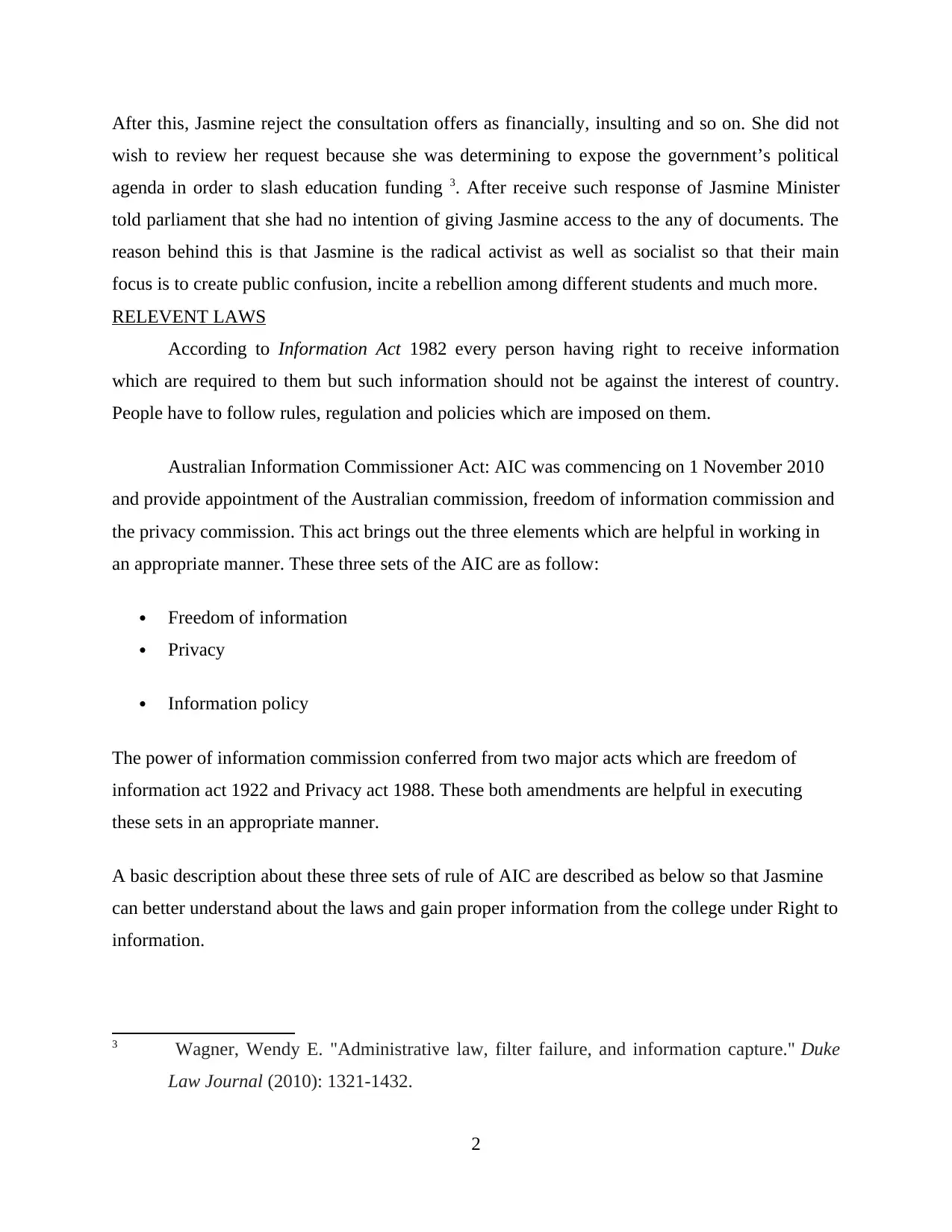
After this, Jasmine reject the consultation offers as financially, insulting and so on. She did not
wish to review her request because she was determining to expose the government’s political
agenda in order to slash education funding 3. After receive such response of Jasmine Minister
told parliament that she had no intention of giving Jasmine access to the any of documents. The
reason behind this is that Jasmine is the radical activist as well as socialist so that their main
focus is to create public confusion, incite a rebellion among different students and much more.
RELEVENT LAWS
According to Information Act 1982 every person having right to receive information
which are required to them but such information should not be against the interest of country.
People have to follow rules, regulation and policies which are imposed on them.
Australian Information Commissioner Act: AIC was commencing on 1 November 2010
and provide appointment of the Australian commission, freedom of information commission and
the privacy commission. This act brings out the three elements which are helpful in working in
an appropriate manner. These three sets of the AIC are as follow:
Freedom of information
Privacy
Information policy
The power of information commission conferred from two major acts which are freedom of
information act 1922 and Privacy act 1988. These both amendments are helpful in executing
these sets in an appropriate manner.
A basic description about these three sets of rule of AIC are described as below so that Jasmine
can better understand about the laws and gain proper information from the college under Right to
information.
3 Wagner, Wendy E. "Administrative law, filter failure, and information capture." Duke
Law Journal (2010): 1321-1432.
2
wish to review her request because she was determining to expose the government’s political
agenda in order to slash education funding 3. After receive such response of Jasmine Minister
told parliament that she had no intention of giving Jasmine access to the any of documents. The
reason behind this is that Jasmine is the radical activist as well as socialist so that their main
focus is to create public confusion, incite a rebellion among different students and much more.
RELEVENT LAWS
According to Information Act 1982 every person having right to receive information
which are required to them but such information should not be against the interest of country.
People have to follow rules, regulation and policies which are imposed on them.
Australian Information Commissioner Act: AIC was commencing on 1 November 2010
and provide appointment of the Australian commission, freedom of information commission and
the privacy commission. This act brings out the three elements which are helpful in working in
an appropriate manner. These three sets of the AIC are as follow:
Freedom of information
Privacy
Information policy
The power of information commission conferred from two major acts which are freedom of
information act 1922 and Privacy act 1988. These both amendments are helpful in executing
these sets in an appropriate manner.
A basic description about these three sets of rule of AIC are described as below so that Jasmine
can better understand about the laws and gain proper information from the college under Right to
information.
3 Wagner, Wendy E. "Administrative law, filter failure, and information capture." Duke
Law Journal (2010): 1321-1432.
2
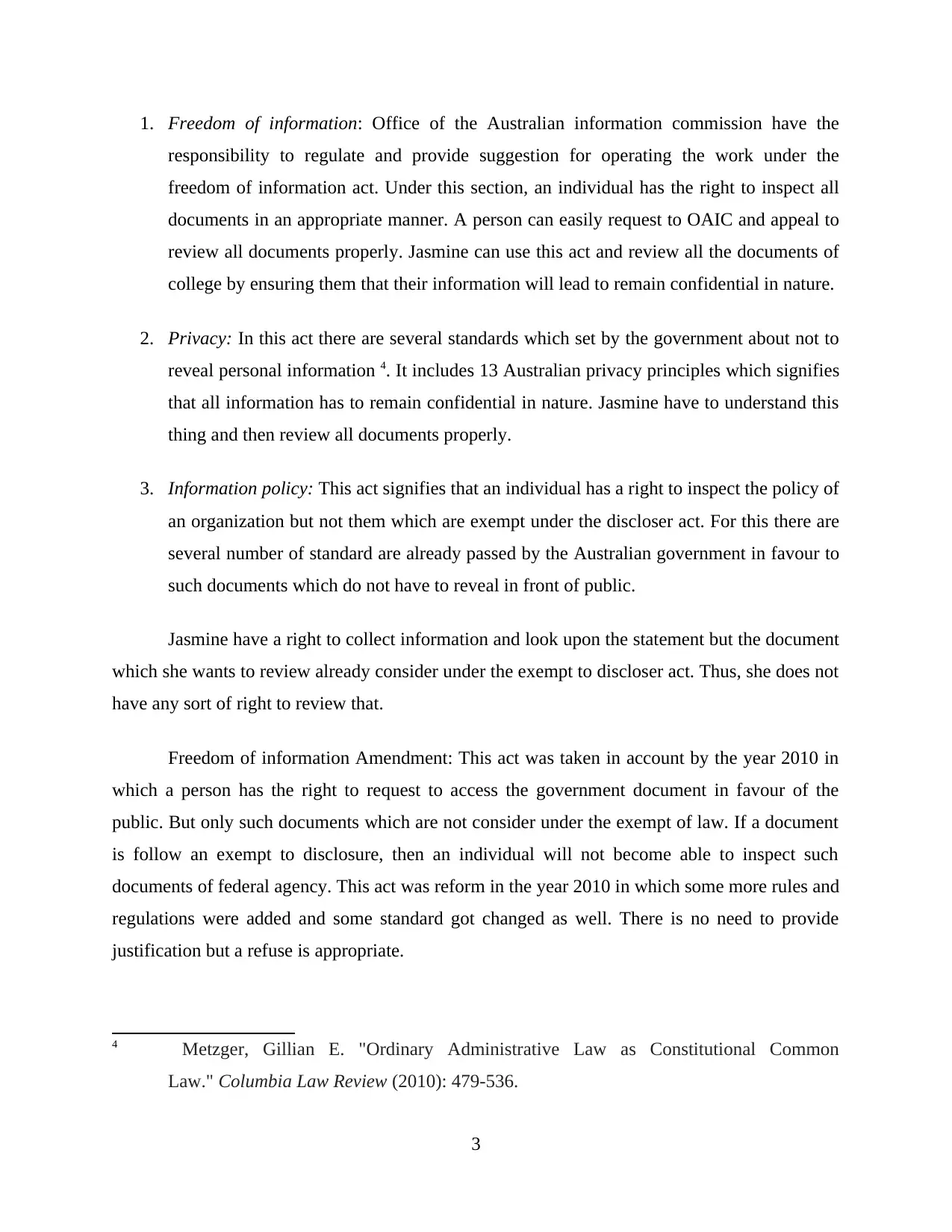
1. Freedom of information: Office of the Australian information commission have the
responsibility to regulate and provide suggestion for operating the work under the
freedom of information act. Under this section, an individual has the right to inspect all
documents in an appropriate manner. A person can easily request to OAIC and appeal to
review all documents properly. Jasmine can use this act and review all the documents of
college by ensuring them that their information will lead to remain confidential in nature.
2. Privacy: In this act there are several standards which set by the government about not to
reveal personal information 4. It includes 13 Australian privacy principles which signifies
that all information has to remain confidential in nature. Jasmine have to understand this
thing and then review all documents properly.
3. Information policy: This act signifies that an individual has a right to inspect the policy of
an organization but not them which are exempt under the discloser act. For this there are
several number of standard are already passed by the Australian government in favour to
such documents which do not have to reveal in front of public.
Jasmine have a right to collect information and look upon the statement but the document
which she wants to review already consider under the exempt to discloser act. Thus, she does not
have any sort of right to review that.
Freedom of information Amendment: This act was taken in account by the year 2010 in
which a person has the right to request to access the government document in favour of the
public. But only such documents which are not consider under the exempt of law. If a document
is follow an exempt to disclosure, then an individual will not become able to inspect such
documents of federal agency. This act was reform in the year 2010 in which some more rules and
regulations were added and some standard got changed as well. There is no need to provide
justification but a refuse is appropriate.
4 Metzger, Gillian E. "Ordinary Administrative Law as Constitutional Common
Law." Columbia Law Review (2010): 479-536.
3
responsibility to regulate and provide suggestion for operating the work under the
freedom of information act. Under this section, an individual has the right to inspect all
documents in an appropriate manner. A person can easily request to OAIC and appeal to
review all documents properly. Jasmine can use this act and review all the documents of
college by ensuring them that their information will lead to remain confidential in nature.
2. Privacy: In this act there are several standards which set by the government about not to
reveal personal information 4. It includes 13 Australian privacy principles which signifies
that all information has to remain confidential in nature. Jasmine have to understand this
thing and then review all documents properly.
3. Information policy: This act signifies that an individual has a right to inspect the policy of
an organization but not them which are exempt under the discloser act. For this there are
several number of standard are already passed by the Australian government in favour to
such documents which do not have to reveal in front of public.
Jasmine have a right to collect information and look upon the statement but the document
which she wants to review already consider under the exempt to discloser act. Thus, she does not
have any sort of right to review that.
Freedom of information Amendment: This act was taken in account by the year 2010 in
which a person has the right to request to access the government document in favour of the
public. But only such documents which are not consider under the exempt of law. If a document
is follow an exempt to disclosure, then an individual will not become able to inspect such
documents of federal agency. This act was reform in the year 2010 in which some more rules and
regulations were added and some standard got changed as well. There is no need to provide
justification but a refuse is appropriate.
4 Metzger, Gillian E. "Ordinary Administrative Law as Constitutional Common
Law." Columbia Law Review (2010): 479-536.
3
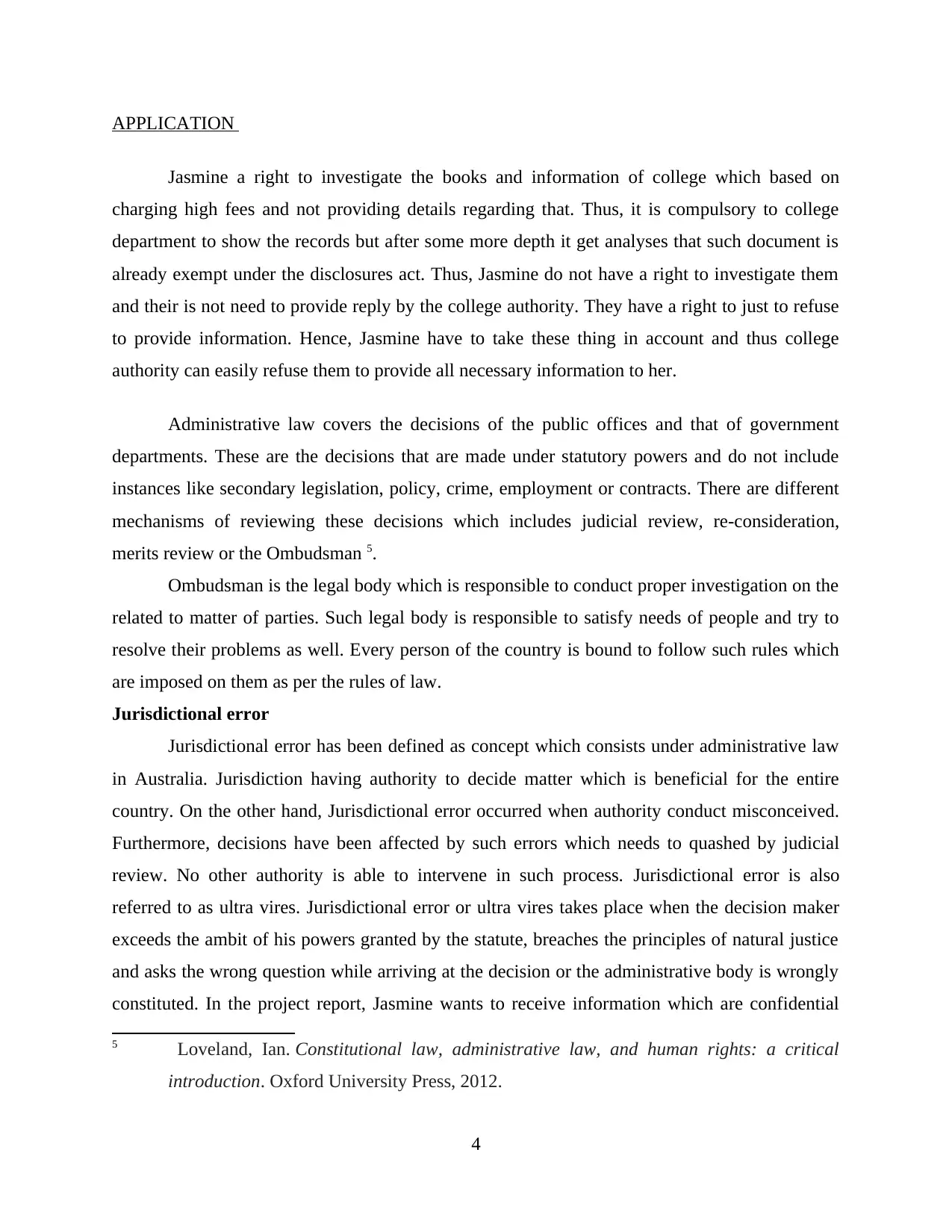
APPLICATION
Jasmine a right to investigate the books and information of college which based on
charging high fees and not providing details regarding that. Thus, it is compulsory to college
department to show the records but after some more depth it get analyses that such document is
already exempt under the disclosures act. Thus, Jasmine do not have a right to investigate them
and their is not need to provide reply by the college authority. They have a right to just to refuse
to provide information. Hence, Jasmine have to take these thing in account and thus college
authority can easily refuse them to provide all necessary information to her.
Administrative law covers the decisions of the public offices and that of government
departments. These are the decisions that are made under statutory powers and do not include
instances like secondary legislation, policy, crime, employment or contracts. There are different
mechanisms of reviewing these decisions which includes judicial review, re-consideration,
merits review or the Ombudsman 5.
Ombudsman is the legal body which is responsible to conduct proper investigation on the
related to matter of parties. Such legal body is responsible to satisfy needs of people and try to
resolve their problems as well. Every person of the country is bound to follow such rules which
are imposed on them as per the rules of law.
Jurisdictional error
Jurisdictional error has been defined as concept which consists under administrative law
in Australia. Jurisdiction having authority to decide matter which is beneficial for the entire
country. On the other hand, Jurisdictional error occurred when authority conduct misconceived.
Furthermore, decisions have been affected by such errors which needs to quashed by judicial
review. No other authority is able to intervene in such process. Jurisdictional error is also
referred to as ultra vires. Jurisdictional error or ultra vires takes place when the decision maker
exceeds the ambit of his powers granted by the statute, breaches the principles of natural justice
and asks the wrong question while arriving at the decision or the administrative body is wrongly
constituted. In the project report, Jasmine wants to receive information which are confidential
5 Loveland, Ian. Constitutional law, administrative law, and human rights: a critical
introduction. Oxford University Press, 2012.
4
Jasmine a right to investigate the books and information of college which based on
charging high fees and not providing details regarding that. Thus, it is compulsory to college
department to show the records but after some more depth it get analyses that such document is
already exempt under the disclosures act. Thus, Jasmine do not have a right to investigate them
and their is not need to provide reply by the college authority. They have a right to just to refuse
to provide information. Hence, Jasmine have to take these thing in account and thus college
authority can easily refuse them to provide all necessary information to her.
Administrative law covers the decisions of the public offices and that of government
departments. These are the decisions that are made under statutory powers and do not include
instances like secondary legislation, policy, crime, employment or contracts. There are different
mechanisms of reviewing these decisions which includes judicial review, re-consideration,
merits review or the Ombudsman 5.
Ombudsman is the legal body which is responsible to conduct proper investigation on the
related to matter of parties. Such legal body is responsible to satisfy needs of people and try to
resolve their problems as well. Every person of the country is bound to follow such rules which
are imposed on them as per the rules of law.
Jurisdictional error
Jurisdictional error has been defined as concept which consists under administrative law
in Australia. Jurisdiction having authority to decide matter which is beneficial for the entire
country. On the other hand, Jurisdictional error occurred when authority conduct misconceived.
Furthermore, decisions have been affected by such errors which needs to quashed by judicial
review. No other authority is able to intervene in such process. Jurisdictional error is also
referred to as ultra vires. Jurisdictional error or ultra vires takes place when the decision maker
exceeds the ambit of his powers granted by the statute, breaches the principles of natural justice
and asks the wrong question while arriving at the decision or the administrative body is wrongly
constituted. In the project report, Jasmine wants to receive information which are confidential
5 Loveland, Ian. Constitutional law, administrative law, and human rights: a critical
introduction. Oxford University Press, 2012.
4
Paraphrase This Document
Need a fresh take? Get an instant paraphrase of this document with our AI Paraphraser
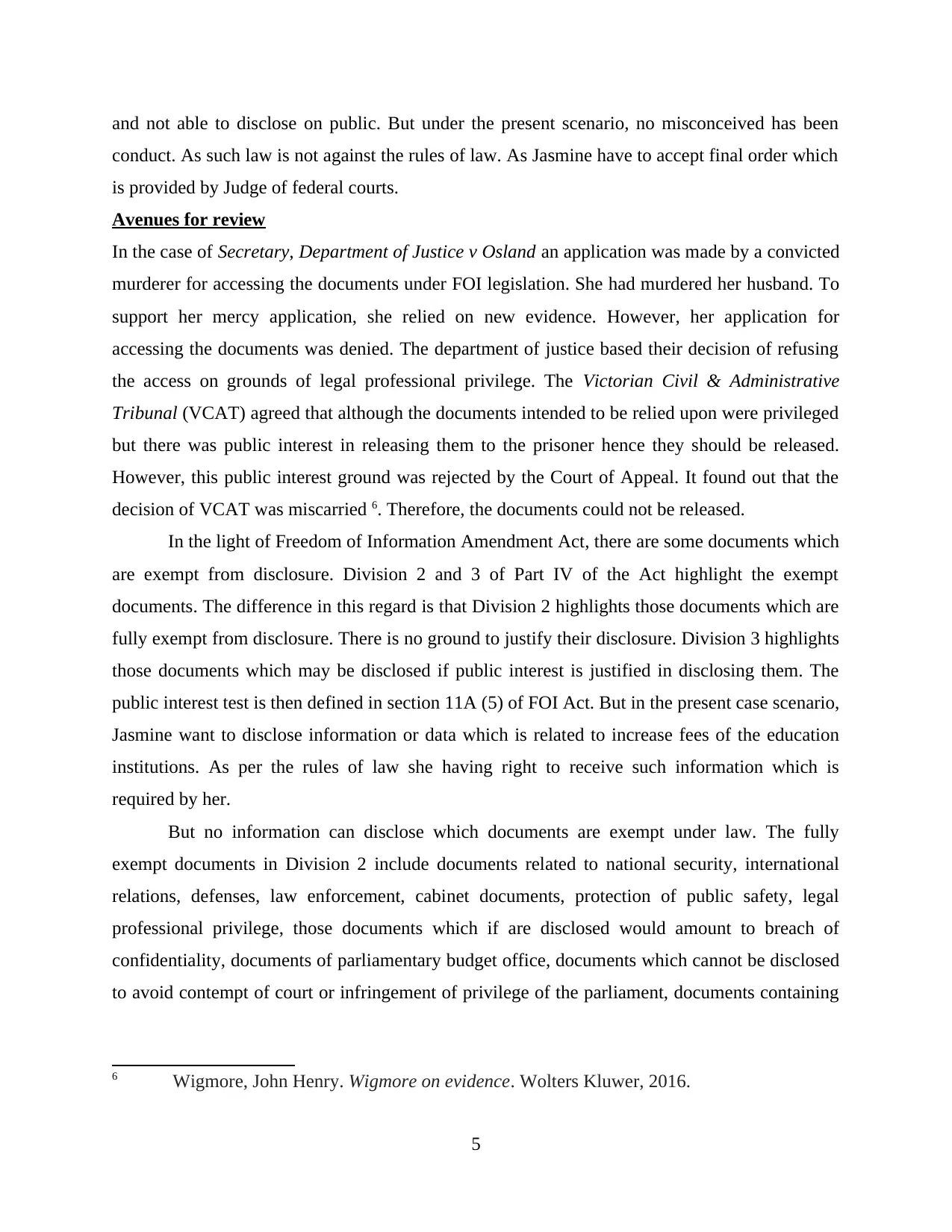
and not able to disclose on public. But under the present scenario, no misconceived has been
conduct. As such law is not against the rules of law. As Jasmine have to accept final order which
is provided by Judge of federal courts.
Avenues for review
In the case of Secretary, Department of Justice v Osland an application was made by a convicted
murderer for accessing the documents under FOI legislation. She had murdered her husband. To
support her mercy application, she relied on new evidence. However, her application for
accessing the documents was denied. The department of justice based their decision of refusing
the access on grounds of legal professional privilege. The Victorian Civil & Administrative
Tribunal (VCAT) agreed that although the documents intended to be relied upon were privileged
but there was public interest in releasing them to the prisoner hence they should be released.
However, this public interest ground was rejected by the Court of Appeal. It found out that the
decision of VCAT was miscarried 6. Therefore, the documents could not be released.
In the light of Freedom of Information Amendment Act, there are some documents which
are exempt from disclosure. Division 2 and 3 of Part IV of the Act highlight the exempt
documents. The difference in this regard is that Division 2 highlights those documents which are
fully exempt from disclosure. There is no ground to justify their disclosure. Division 3 highlights
those documents which may be disclosed if public interest is justified in disclosing them. The
public interest test is then defined in section 11A (5) of FOI Act. But in the present case scenario,
Jasmine want to disclose information or data which is related to increase fees of the education
institutions. As per the rules of law she having right to receive such information which is
required by her.
But no information can disclose which documents are exempt under law. The fully
exempt documents in Division 2 include documents related to national security, international
relations, defenses, law enforcement, cabinet documents, protection of public safety, legal
professional privilege, those documents which if are disclosed would amount to breach of
confidentiality, documents of parliamentary budget office, documents which cannot be disclosed
to avoid contempt of court or infringement of privilege of the parliament, documents containing
6 Wigmore, John Henry. Wigmore on evidence. Wolters Kluwer, 2016.
5
conduct. As such law is not against the rules of law. As Jasmine have to accept final order which
is provided by Judge of federal courts.
Avenues for review
In the case of Secretary, Department of Justice v Osland an application was made by a convicted
murderer for accessing the documents under FOI legislation. She had murdered her husband. To
support her mercy application, she relied on new evidence. However, her application for
accessing the documents was denied. The department of justice based their decision of refusing
the access on grounds of legal professional privilege. The Victorian Civil & Administrative
Tribunal (VCAT) agreed that although the documents intended to be relied upon were privileged
but there was public interest in releasing them to the prisoner hence they should be released.
However, this public interest ground was rejected by the Court of Appeal. It found out that the
decision of VCAT was miscarried 6. Therefore, the documents could not be released.
In the light of Freedom of Information Amendment Act, there are some documents which
are exempt from disclosure. Division 2 and 3 of Part IV of the Act highlight the exempt
documents. The difference in this regard is that Division 2 highlights those documents which are
fully exempt from disclosure. There is no ground to justify their disclosure. Division 3 highlights
those documents which may be disclosed if public interest is justified in disclosing them. The
public interest test is then defined in section 11A (5) of FOI Act. But in the present case scenario,
Jasmine want to disclose information or data which is related to increase fees of the education
institutions. As per the rules of law she having right to receive such information which is
required by her.
But no information can disclose which documents are exempt under law. The fully
exempt documents in Division 2 include documents related to national security, international
relations, defenses, law enforcement, cabinet documents, protection of public safety, legal
professional privilege, those documents which if are disclosed would amount to breach of
confidentiality, documents of parliamentary budget office, documents which cannot be disclosed
to avoid contempt of court or infringement of privilege of the parliament, documents containing
6 Wigmore, John Henry. Wigmore on evidence. Wolters Kluwer, 2016.
5
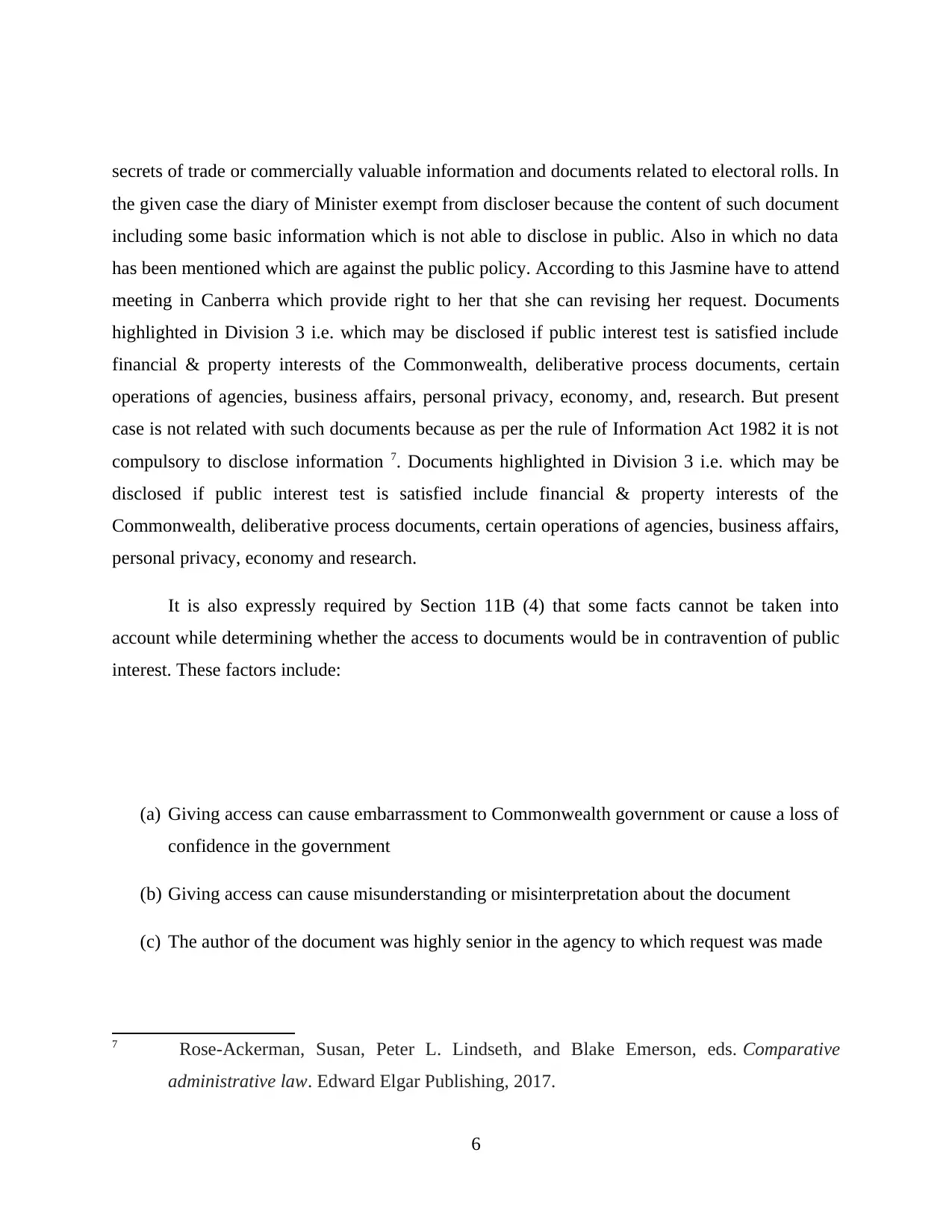
secrets of trade or commercially valuable information and documents related to electoral rolls. In
the given case the diary of Minister exempt from discloser because the content of such document
including some basic information which is not able to disclose in public. Also in which no data
has been mentioned which are against the public policy. According to this Jasmine have to attend
meeting in Canberra which provide right to her that she can revising her request. Documents
highlighted in Division 3 i.e. which may be disclosed if public interest test is satisfied include
financial & property interests of the Commonwealth, deliberative process documents, certain
operations of agencies, business affairs, personal privacy, economy, and, research. But present
case is not related with such documents because as per the rule of Information Act 1982 it is not
compulsory to disclose information 7. Documents highlighted in Division 3 i.e. which may be
disclosed if public interest test is satisfied include financial & property interests of the
Commonwealth, deliberative process documents, certain operations of agencies, business affairs,
personal privacy, economy and research.
It is also expressly required by Section 11B (4) that some facts cannot be taken into
account while determining whether the access to documents would be in contravention of public
interest. These factors include:
(a) Giving access can cause embarrassment to Commonwealth government or cause a loss of
confidence in the government
(b) Giving access can cause misunderstanding or misinterpretation about the document
(c) The author of the document was highly senior in the agency to which request was made
7 Rose-Ackerman, Susan, Peter L. Lindseth, and Blake Emerson, eds. Comparative
administrative law. Edward Elgar Publishing, 2017.
6
the given case the diary of Minister exempt from discloser because the content of such document
including some basic information which is not able to disclose in public. Also in which no data
has been mentioned which are against the public policy. According to this Jasmine have to attend
meeting in Canberra which provide right to her that she can revising her request. Documents
highlighted in Division 3 i.e. which may be disclosed if public interest test is satisfied include
financial & property interests of the Commonwealth, deliberative process documents, certain
operations of agencies, business affairs, personal privacy, economy, and, research. But present
case is not related with such documents because as per the rule of Information Act 1982 it is not
compulsory to disclose information 7. Documents highlighted in Division 3 i.e. which may be
disclosed if public interest test is satisfied include financial & property interests of the
Commonwealth, deliberative process documents, certain operations of agencies, business affairs,
personal privacy, economy and research.
It is also expressly required by Section 11B (4) that some facts cannot be taken into
account while determining whether the access to documents would be in contravention of public
interest. These factors include:
(a) Giving access can cause embarrassment to Commonwealth government or cause a loss of
confidence in the government
(b) Giving access can cause misunderstanding or misinterpretation about the document
(c) The author of the document was highly senior in the agency to which request was made
7 Rose-Ackerman, Susan, Peter L. Lindseth, and Blake Emerson, eds. Comparative
administrative law. Edward Elgar Publishing, 2017.
6
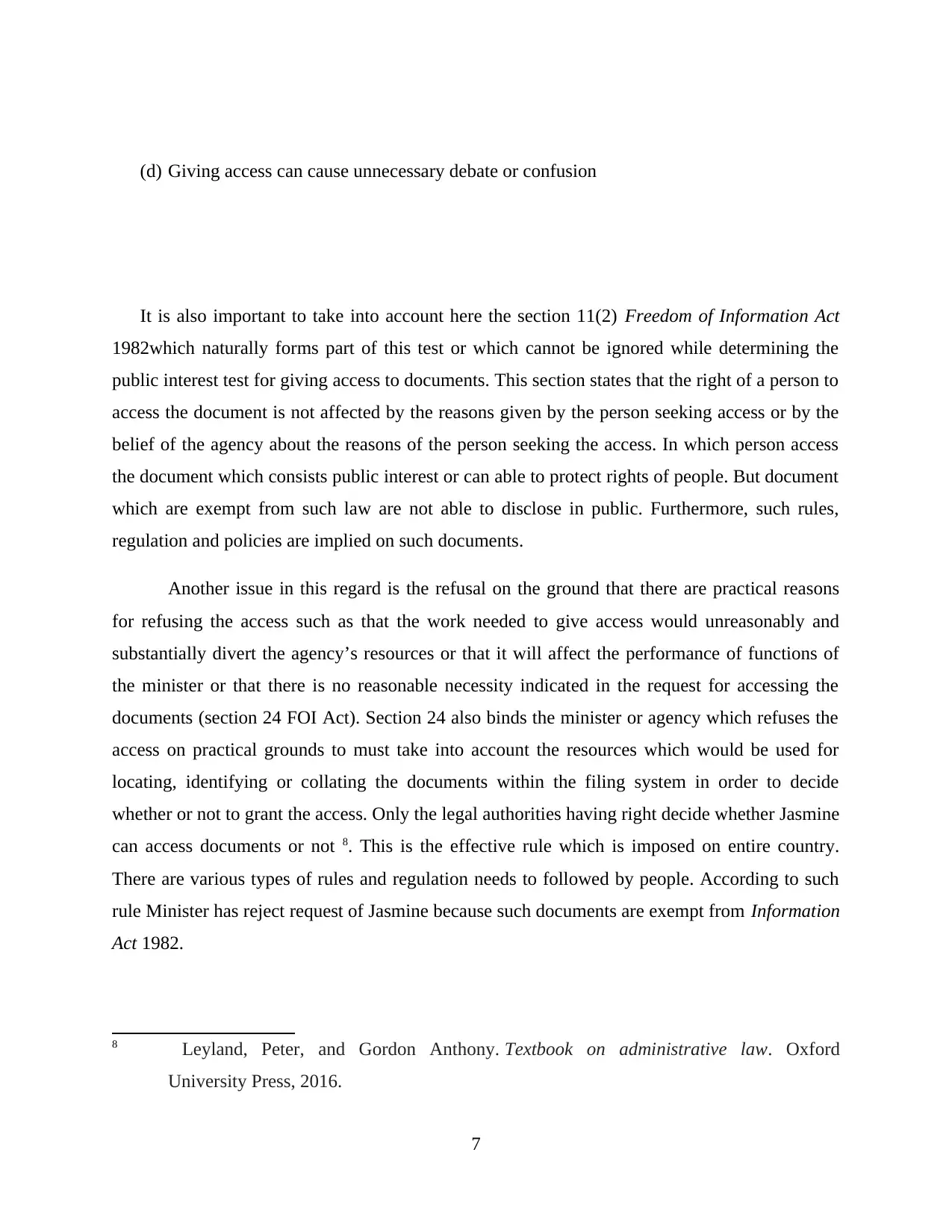
(d) Giving access can cause unnecessary debate or confusion
It is also important to take into account here the section 11(2) Freedom of Information Act
1982which naturally forms part of this test or which cannot be ignored while determining the
public interest test for giving access to documents. This section states that the right of a person to
access the document is not affected by the reasons given by the person seeking access or by the
belief of the agency about the reasons of the person seeking the access. In which person access
the document which consists public interest or can able to protect rights of people. But document
which are exempt from such law are not able to disclose in public. Furthermore, such rules,
regulation and policies are implied on such documents.
Another issue in this regard is the refusal on the ground that there are practical reasons
for refusing the access such as that the work needed to give access would unreasonably and
substantially divert the agency’s resources or that it will affect the performance of functions of
the minister or that there is no reasonable necessity indicated in the request for accessing the
documents (section 24 FOI Act). Section 24 also binds the minister or agency which refuses the
access on practical grounds to must take into account the resources which would be used for
locating, identifying or collating the documents within the filing system in order to decide
whether or not to grant the access. Only the legal authorities having right decide whether Jasmine
can access documents or not 8. This is the effective rule which is imposed on entire country.
There are various types of rules and regulation needs to followed by people. According to such
rule Minister has reject request of Jasmine because such documents are exempt from Information
Act 1982.
8 Leyland, Peter, and Gordon Anthony. Textbook on administrative law. Oxford
University Press, 2016.
7
It is also important to take into account here the section 11(2) Freedom of Information Act
1982which naturally forms part of this test or which cannot be ignored while determining the
public interest test for giving access to documents. This section states that the right of a person to
access the document is not affected by the reasons given by the person seeking access or by the
belief of the agency about the reasons of the person seeking the access. In which person access
the document which consists public interest or can able to protect rights of people. But document
which are exempt from such law are not able to disclose in public. Furthermore, such rules,
regulation and policies are implied on such documents.
Another issue in this regard is the refusal on the ground that there are practical reasons
for refusing the access such as that the work needed to give access would unreasonably and
substantially divert the agency’s resources or that it will affect the performance of functions of
the minister or that there is no reasonable necessity indicated in the request for accessing the
documents (section 24 FOI Act). Section 24 also binds the minister or agency which refuses the
access on practical grounds to must take into account the resources which would be used for
locating, identifying or collating the documents within the filing system in order to decide
whether or not to grant the access. Only the legal authorities having right decide whether Jasmine
can access documents or not 8. This is the effective rule which is imposed on entire country.
There are various types of rules and regulation needs to followed by people. According to such
rule Minister has reject request of Jasmine because such documents are exempt from Information
Act 1982.
8 Leyland, Peter, and Gordon Anthony. Textbook on administrative law. Oxford
University Press, 2016.
7
Secure Best Marks with AI Grader
Need help grading? Try our AI Grader for instant feedback on your assignments.
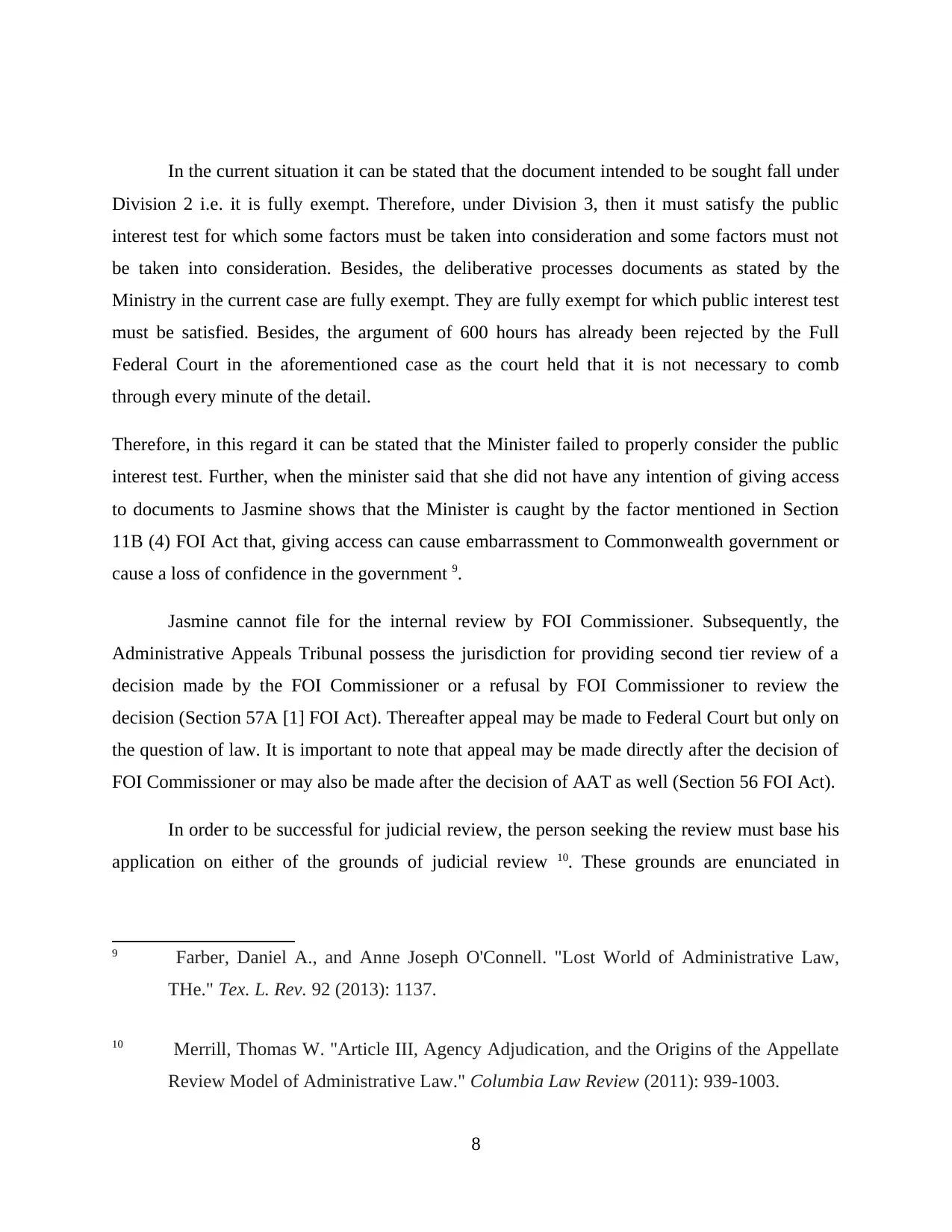
In the current situation it can be stated that the document intended to be sought fall under
Division 2 i.e. it is fully exempt. Therefore, under Division 3, then it must satisfy the public
interest test for which some factors must be taken into consideration and some factors must not
be taken into consideration. Besides, the deliberative processes documents as stated by the
Ministry in the current case are fully exempt. They are fully exempt for which public interest test
must be satisfied. Besides, the argument of 600 hours has already been rejected by the Full
Federal Court in the aforementioned case as the court held that it is not necessary to comb
through every minute of the detail.
Therefore, in this regard it can be stated that the Minister failed to properly consider the public
interest test. Further, when the minister said that she did not have any intention of giving access
to documents to Jasmine shows that the Minister is caught by the factor mentioned in Section
11B (4) FOI Act that, giving access can cause embarrassment to Commonwealth government or
cause a loss of confidence in the government 9.
Jasmine cannot file for the internal review by FOI Commissioner. Subsequently, the
Administrative Appeals Tribunal possess the jurisdiction for providing second tier review of a
decision made by the FOI Commissioner or a refusal by FOI Commissioner to review the
decision (Section 57A [1] FOI Act). Thereafter appeal may be made to Federal Court but only on
the question of law. It is important to note that appeal may be made directly after the decision of
FOI Commissioner or may also be made after the decision of AAT as well (Section 56 FOI Act).
In order to be successful for judicial review, the person seeking the review must base his
application on either of the grounds of judicial review 10. These grounds are enunciated in
9 Farber, Daniel A., and Anne Joseph O'Connell. "Lost World of Administrative Law,
THe." Tex. L. Rev. 92 (2013): 1137.
10 Merrill, Thomas W. "Article III, Agency Adjudication, and the Origins of the Appellate
Review Model of Administrative Law." Columbia Law Review (2011): 939-1003.
8
Division 2 i.e. it is fully exempt. Therefore, under Division 3, then it must satisfy the public
interest test for which some factors must be taken into consideration and some factors must not
be taken into consideration. Besides, the deliberative processes documents as stated by the
Ministry in the current case are fully exempt. They are fully exempt for which public interest test
must be satisfied. Besides, the argument of 600 hours has already been rejected by the Full
Federal Court in the aforementioned case as the court held that it is not necessary to comb
through every minute of the detail.
Therefore, in this regard it can be stated that the Minister failed to properly consider the public
interest test. Further, when the minister said that she did not have any intention of giving access
to documents to Jasmine shows that the Minister is caught by the factor mentioned in Section
11B (4) FOI Act that, giving access can cause embarrassment to Commonwealth government or
cause a loss of confidence in the government 9.
Jasmine cannot file for the internal review by FOI Commissioner. Subsequently, the
Administrative Appeals Tribunal possess the jurisdiction for providing second tier review of a
decision made by the FOI Commissioner or a refusal by FOI Commissioner to review the
decision (Section 57A [1] FOI Act). Thereafter appeal may be made to Federal Court but only on
the question of law. It is important to note that appeal may be made directly after the decision of
FOI Commissioner or may also be made after the decision of AAT as well (Section 56 FOI Act).
In order to be successful for judicial review, the person seeking the review must base his
application on either of the grounds of judicial review 10. These grounds are enunciated in
9 Farber, Daniel A., and Anne Joseph O'Connell. "Lost World of Administrative Law,
THe." Tex. L. Rev. 92 (2013): 1137.
10 Merrill, Thomas W. "Article III, Agency Adjudication, and the Origins of the Appellate
Review Model of Administrative Law." Columbia Law Review (2011): 939-1003.
8
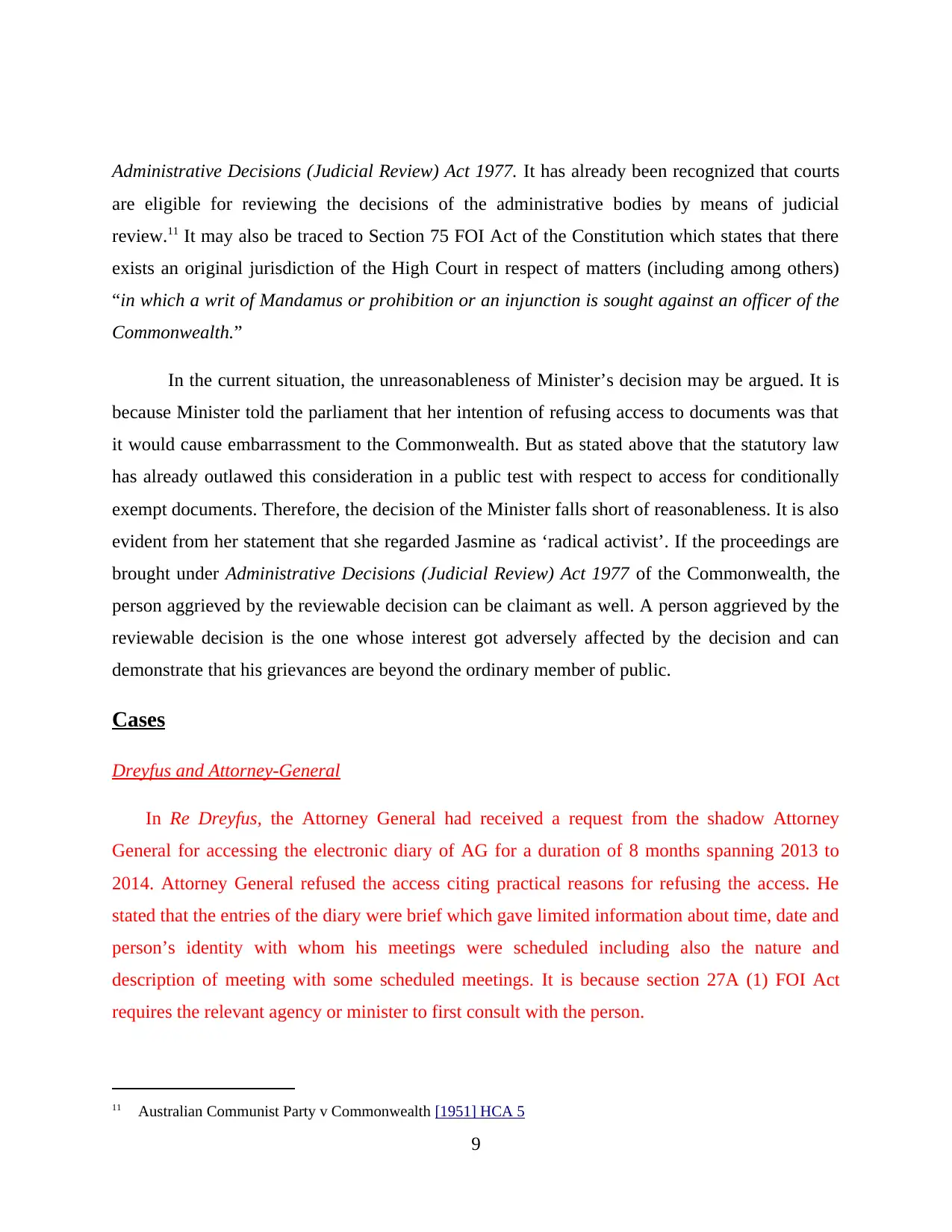
Administrative Decisions (Judicial Review) Act 1977. It has already been recognized that courts
are eligible for reviewing the decisions of the administrative bodies by means of judicial
review.11 It may also be traced to Section 75 FOI Act of the Constitution which states that there
exists an original jurisdiction of the High Court in respect of matters (including among others)
“in which a writ of Mandamus or prohibition or an injunction is sought against an officer of the
Commonwealth.”
In the current situation, the unreasonableness of Minister’s decision may be argued. It is
because Minister told the parliament that her intention of refusing access to documents was that
it would cause embarrassment to the Commonwealth. But as stated above that the statutory law
has already outlawed this consideration in a public test with respect to access for conditionally
exempt documents. Therefore, the decision of the Minister falls short of reasonableness. It is also
evident from her statement that she regarded Jasmine as ‘radical activist’. If the proceedings are
brought under Administrative Decisions (Judicial Review) Act 1977 of the Commonwealth, the
person aggrieved by the reviewable decision can be claimant as well. A person aggrieved by the
reviewable decision is the one whose interest got adversely affected by the decision and can
demonstrate that his grievances are beyond the ordinary member of public.
Cases
Dreyfus and Attorney-General
In Re Dreyfus, the Attorney General had received a request from the shadow Attorney
General for accessing the electronic diary of AG for a duration of 8 months spanning 2013 to
2014. Attorney General refused the access citing practical reasons for refusing the access. He
stated that the entries of the diary were brief which gave limited information about time, date and
person’s identity with whom his meetings were scheduled including also the nature and
description of meeting with some scheduled meetings. It is because section 27A (1) FOI Act
requires the relevant agency or minister to first consult with the person.
11 Australian Communist Party v Commonwealth [1951] HCA 5
9
are eligible for reviewing the decisions of the administrative bodies by means of judicial
review.11 It may also be traced to Section 75 FOI Act of the Constitution which states that there
exists an original jurisdiction of the High Court in respect of matters (including among others)
“in which a writ of Mandamus or prohibition or an injunction is sought against an officer of the
Commonwealth.”
In the current situation, the unreasonableness of Minister’s decision may be argued. It is
because Minister told the parliament that her intention of refusing access to documents was that
it would cause embarrassment to the Commonwealth. But as stated above that the statutory law
has already outlawed this consideration in a public test with respect to access for conditionally
exempt documents. Therefore, the decision of the Minister falls short of reasonableness. It is also
evident from her statement that she regarded Jasmine as ‘radical activist’. If the proceedings are
brought under Administrative Decisions (Judicial Review) Act 1977 of the Commonwealth, the
person aggrieved by the reviewable decision can be claimant as well. A person aggrieved by the
reviewable decision is the one whose interest got adversely affected by the decision and can
demonstrate that his grievances are beyond the ordinary member of public.
Cases
Dreyfus and Attorney-General
In Re Dreyfus, the Attorney General had received a request from the shadow Attorney
General for accessing the electronic diary of AG for a duration of 8 months spanning 2013 to
2014. Attorney General refused the access citing practical reasons for refusing the access. He
stated that the entries of the diary were brief which gave limited information about time, date and
person’s identity with whom his meetings were scheduled including also the nature and
description of meeting with some scheduled meetings. It is because section 27A (1) FOI Act
requires the relevant agency or minister to first consult with the person.
11 Australian Communist Party v Commonwealth [1951] HCA 5
9
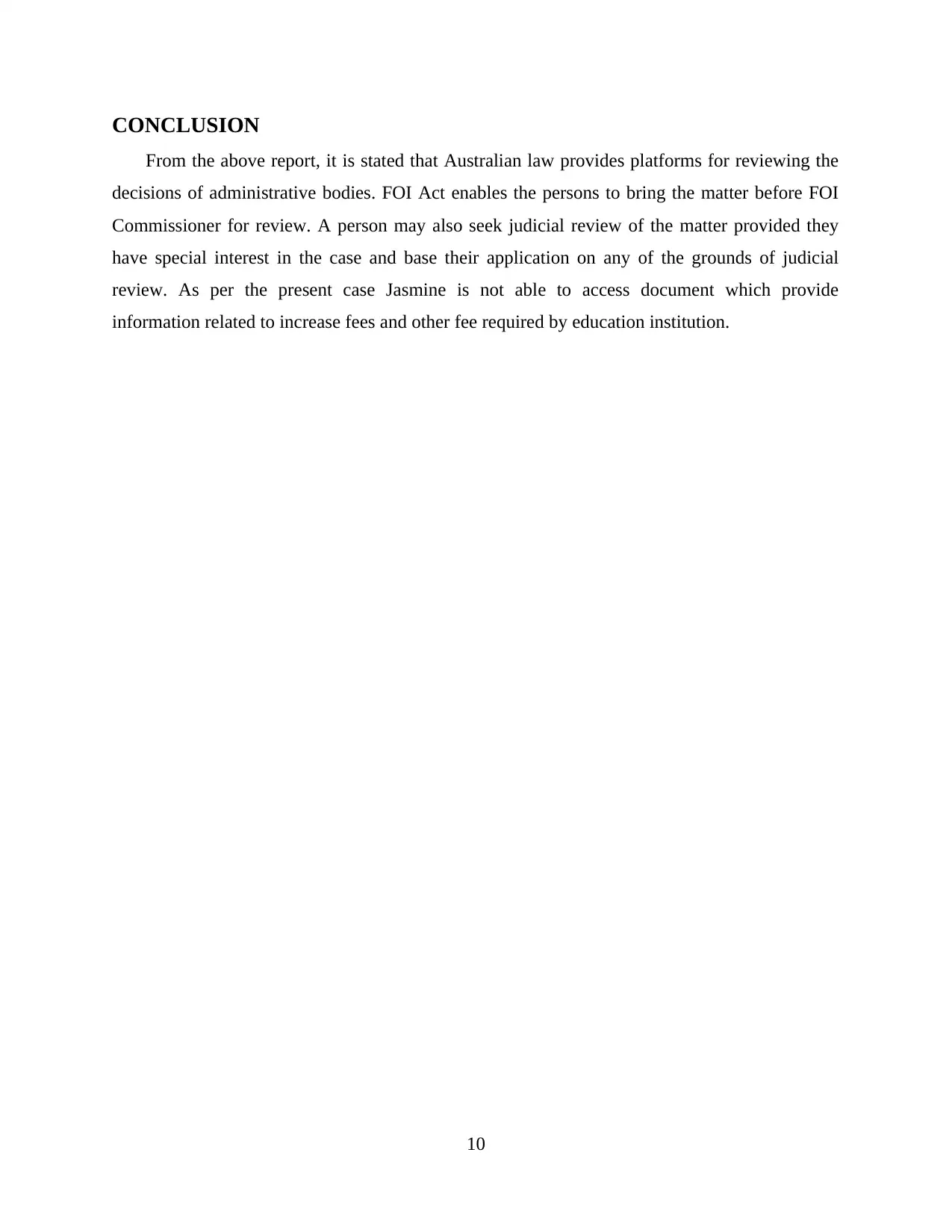
CONCLUSION
From the above report, it is stated that Australian law provides platforms for reviewing the
decisions of administrative bodies. FOI Act enables the persons to bring the matter before FOI
Commissioner for review. A person may also seek judicial review of the matter provided they
have special interest in the case and base their application on any of the grounds of judicial
review. As per the present case Jasmine is not able to access document which provide
information related to increase fees and other fee required by education institution.
10
From the above report, it is stated that Australian law provides platforms for reviewing the
decisions of administrative bodies. FOI Act enables the persons to bring the matter before FOI
Commissioner for review. A person may also seek judicial review of the matter provided they
have special interest in the case and base their application on any of the grounds of judicial
review. As per the present case Jasmine is not able to access document which provide
information related to increase fees and other fee required by education institution.
10
Paraphrase This Document
Need a fresh take? Get an instant paraphrase of this document with our AI Paraphraser
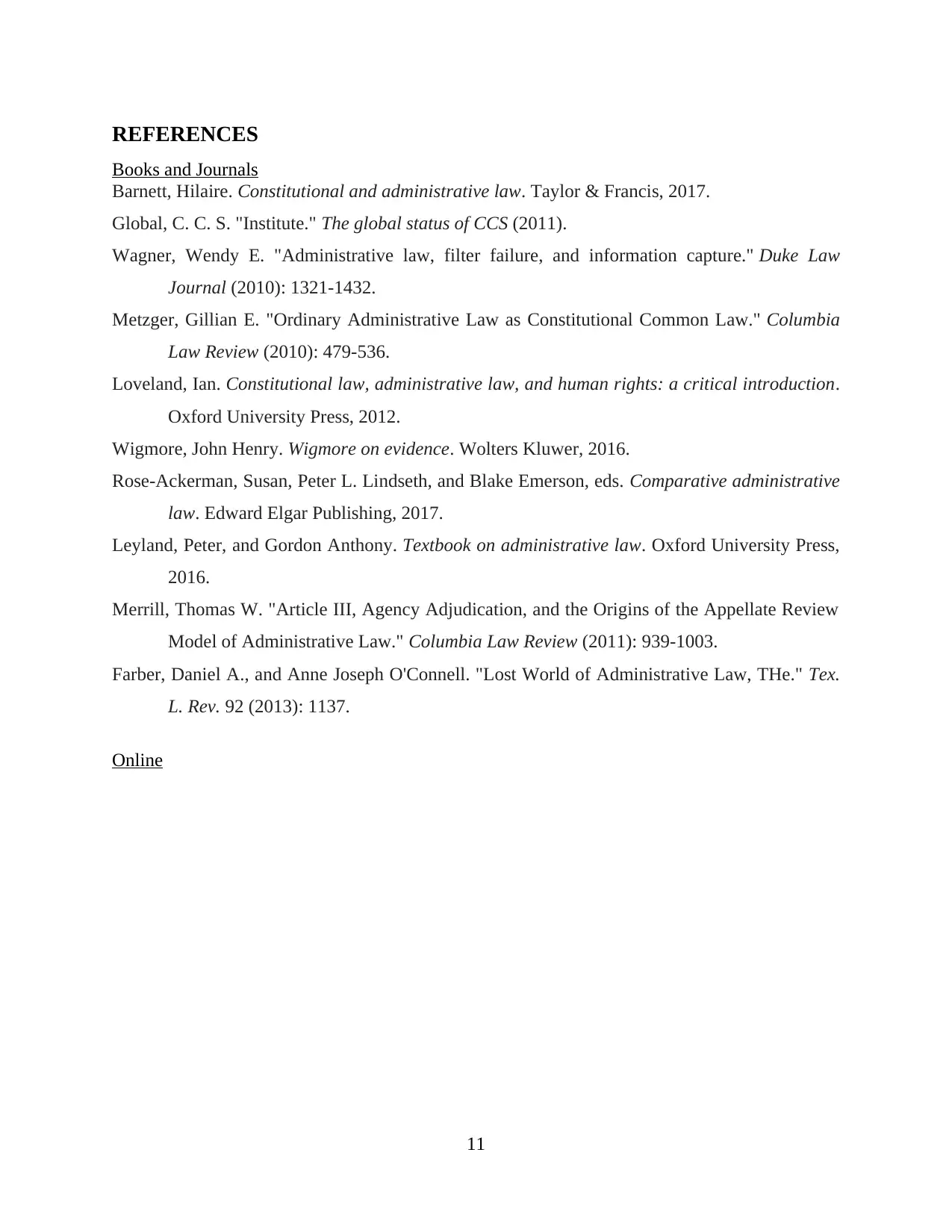
REFERENCES
Books and Journals
Barnett, Hilaire. Constitutional and administrative law. Taylor & Francis, 2017.
Global, C. C. S. "Institute." The global status of CCS (2011).
Wagner, Wendy E. "Administrative law, filter failure, and information capture." Duke Law
Journal (2010): 1321-1432.
Metzger, Gillian E. "Ordinary Administrative Law as Constitutional Common Law." Columbia
Law Review (2010): 479-536.
Loveland, Ian. Constitutional law, administrative law, and human rights: a critical introduction.
Oxford University Press, 2012.
Wigmore, John Henry. Wigmore on evidence. Wolters Kluwer, 2016.
Rose-Ackerman, Susan, Peter L. Lindseth, and Blake Emerson, eds. Comparative administrative
law. Edward Elgar Publishing, 2017.
Leyland, Peter, and Gordon Anthony. Textbook on administrative law. Oxford University Press,
2016.
Merrill, Thomas W. "Article III, Agency Adjudication, and the Origins of the Appellate Review
Model of Administrative Law." Columbia Law Review (2011): 939-1003.
Farber, Daniel A., and Anne Joseph O'Connell. "Lost World of Administrative Law, THe." Tex.
L. Rev. 92 (2013): 1137.
Online
11
Books and Journals
Barnett, Hilaire. Constitutional and administrative law. Taylor & Francis, 2017.
Global, C. C. S. "Institute." The global status of CCS (2011).
Wagner, Wendy E. "Administrative law, filter failure, and information capture." Duke Law
Journal (2010): 1321-1432.
Metzger, Gillian E. "Ordinary Administrative Law as Constitutional Common Law." Columbia
Law Review (2010): 479-536.
Loveland, Ian. Constitutional law, administrative law, and human rights: a critical introduction.
Oxford University Press, 2012.
Wigmore, John Henry. Wigmore on evidence. Wolters Kluwer, 2016.
Rose-Ackerman, Susan, Peter L. Lindseth, and Blake Emerson, eds. Comparative administrative
law. Edward Elgar Publishing, 2017.
Leyland, Peter, and Gordon Anthony. Textbook on administrative law. Oxford University Press,
2016.
Merrill, Thomas W. "Article III, Agency Adjudication, and the Origins of the Appellate Review
Model of Administrative Law." Columbia Law Review (2011): 939-1003.
Farber, Daniel A., and Anne Joseph O'Connell. "Lost World of Administrative Law, THe." Tex.
L. Rev. 92 (2013): 1137.
Online
11
1 out of 14
Related Documents
Your All-in-One AI-Powered Toolkit for Academic Success.
+13062052269
info@desklib.com
Available 24*7 on WhatsApp / Email
![[object Object]](/_next/static/media/star-bottom.7253800d.svg)
Unlock your academic potential
© 2024 | Zucol Services PVT LTD | All rights reserved.





